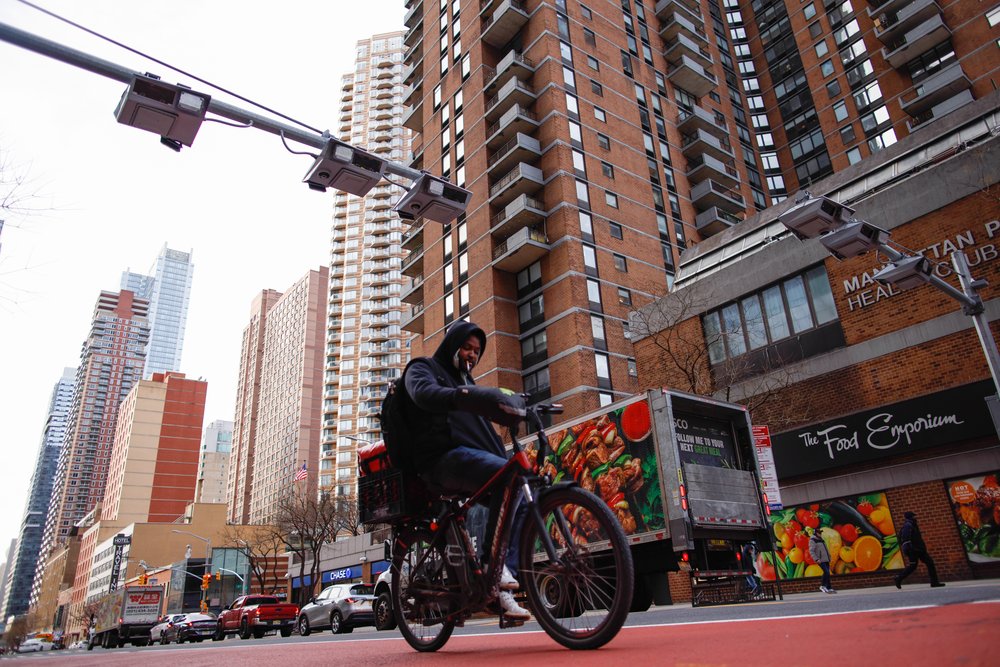Feds threaten NYC highway money if MTA doesn't shut down congestion pricing
April 21, 2025, 12:41 p.m.
A letter from U.S. Transportation Secretary Sean Duffy to Gov. Kathy Hochul on Monday marked the latest turn in the fight over New York's landmark tolling program.

The Trump administration on Monday threatened to withhold federal funding for New York City highway projects if the MTA continues to ignore an order from U.S. Transportation Secretary Sean Duffy to shut down Manhattan's congestion pricing tolls.
In a letter to Gov. Kathy Hochul, Duffy outlined a plan for the Federal Highway Administration to hold up money and regulatory approvals for some federally funded road projects in the city.
Duffy wrote that his department gave New York transportation officials a May 21 deadline to either terminate the MTA's congestion pricing program or demonstrate why it doesn’t violate a federal law prohibiting the collection of tolls on roads that receive federal subsidies.
The letter came a day after Duffy’s previous April 20 deadline to shut down the tolls. MTA officials have said they’ll continue to collect the tolls, which charge drivers a base daytime fee of $9 to enter Manhattan south of 60th Street, until a federal judge orders them to stop.
The letter said the feds would first target federal highway funding for projects in Manhattan, but would move to target funding for street projects across the city and other parts of the state if the MTA continues to ignore its directive. Duffy wrote the feds would not go after projects “essential for safety.” The letter does not make any threats to cut federal funding for New York City’s mass transit infrastructure.
“President Trump and I will not sit back while Gov. Hochul engages in class warfare and prices working-class Americans out of accessing New York City,” Duffy said in a statement. “The federal government sends billions to New York — but we won’t foot the bill if Gov. Hochul continues to implement an illegal toll to backfill the budget of New York’s failing transit system. We are giving New York one last chance to turn back or prove their actions are not illegal.”
Hochul declared "congestion pricing is legal" in a statement responding to Duffy's letter, and said the MTA would continue to collect the tolls.
- heading
- The cost of congestion pricing
- image
- image
- None
- caption
- body
The MTA’s congestion pricing tolls went live on Jan. 5. Here are key aspects of the tolling scheme south of 60th Street in Manhattan:
- A $9 fee on passenger vehicles from 5 a.m. to 9 p.m. on weekdays and from 9 a.m. to 9 p.m. on weekends.
- A 75% discount for all vehicles during the overnight hours, putting the after-hours toll at $2.25.
- A $14.40 toll for smaller trucks, such as box trucks.
- A $21.60 toll for large trucks, including big rigs.
- A $4.50 toll for motorcyclists.
- Yellow and green taxis receive an additional 75-cent surcharge.
- For-hire vehicles such as Uber and Lyft receive an additional $1.50 surcharge.
- Both taxis and app-based for-hire vehicles pass the cost of the tolls onto passengers.
- Drivers who do not use E-ZPass when entering the congestion zone pay an extra 50%.
Lisa Daglian, executive director of the Permanent Citizens Advisory Committee to the MTA, accused Duffy of breaking a longstanding obligation to help maintain the city’s streets.
“Wouldn't it be not just counterintuitive but counterproductive to halt money that's coming in, or that's being dedicated to roadways within the congestion relief zone to support those very roads that people are driving on, just to be a bully?” she said.
It’s unclear exactly what infrastructure would be subject to Duffy’s threatened funding cuts, but Daglian noted the Federal Highway Administration helps cover upgrades to roads like the FDR Drive and bridge repairs.
The MTA and federal government have been in court over the dispute since the feds pulled their approval for the tolls in February.
The transit agency has a pending lawsuit against Duffy and the U.S. Department of Transportation over the order to halt congestion pricing. In court documents, the MTA’s attorneys have argued the tolls were approved last year through the federal government’s Value Pricing Pilot Program, which allows state and local governments to collect tolls on federally subsidized roadways and use the proceeds for other purposes. In the MTA’s case, the money from congestion pricing is slated to finance $15 billion worth of mass transit upgrades.
In a statement on Monday, MTA Chair Janno Lieber said "the legal issues raised in the letter are already appropriately before a federal judge."
Duffy's letter acknowledged the pilot program permits revenue to go toward transit projects, but argued “it is unconscionable as a matter of policy that highway users are being forced to bail out the MTA transit system.”
By many metrics, the toll program is working as intended, according to the MTA. The latest data released by the agency shows the tolls have led to a drastic reduction in Manhattan gridlock, an increase in bus speeds and higher mass transit ridership.
During his presidential campaign last year, Trump vowed on social media to “TERMINATE” the MTA’s congestion pricing tolls during his first week in office.
This story has been updated with additional information.
Adams administration says Trump’s congestion pricing ban ‘undermines the rule of law’